This post may contain affiliate links.
We’ve been living, working and traveling full-time in our RV for 5 years! What a HUGE journey it’s been. Exciting, fun, adventurous. Yet also a learning curve, with our fair share of mistakes, challenges, growth and travel highlights too. We are glass half full kind of folks.
We tend to find the lessons and the positives in just about any situation. So we sat down to reflect on the past 5 years of RV living from Kennebunk, Maine. The same place we filmed our 15 month video update back in the fall of 2015!
With so much content to share, we decided to break it up onto 2 posts. This is part 1.
Celebrating 5 Years of Living Differently
Life on the road is very different from traditional life. Not that many people actually stay out on the road more than a couple of years. Sure, we have met some who have been RV living for over 10 or 20 years. But they are the exceptions, not the norm.
So our FIVE year road-iversary was a great reason to sit down and honestly reflect on our journey. We decided to focus on our top fives. Our highs and lows. Our best decisions. Mistakes and regrets. Challenges and insights. And our favorite travel highlights and personal moments too.
In this first post, we will focus on things we look back on as being our best decisions. Along with the things we look back on as mistakes or regrets that some of you may be able to learn from. So let’s jump in.
5 Best Decisions
1. Took our time and did thorough research about RV Living
When it comes to making big – and potentially life changing decisions – we both like to do our research. We weigh up and examine every possibility. And we have found that tends to pay off.
Making the switch to full time RV living was a huge one. It is about so much more than just deciding where to go! It wasn’t a big, long vacation. At least, not for us. Because we had to factor in work and our future retirement plans, it was more about changing our whole way of life.
We had very little experience with RVs. It was a big and steep learning curve. We spent hundreds of hours immersing, and learning everything we could. From creating budgets, to exploring our options for staying connected on the road for work. Then there was learning about all the different types of RVs, and which would be the best fit for our needs.
Should we sell or rent out our home? How would we get mail? SO many questions. Eventually, through our research, we found enough answers to give us the confidence to make the leap. Sure, there was still much to learn once we were out on the road. But we were SO glad we did as much research as we did ahead of time. There ended up being very few surprises, financial hits or big problems. And we believe this is ultimately what helped set us up for success. Still living the RV life more than five years down the road.
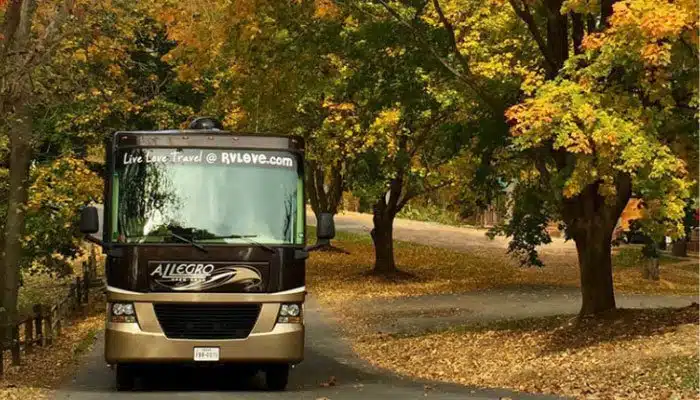
2. Made a good choice in our first RV and toad
We bought a good quality, well cared for, pre-owned motorhome. It even came with an extended warranty that we put to good use. It gave us extra peace of mind and helped offset the expense of some big repairs.
The coach was mostly very reliable. Sure, we had our share of repairs and breakdowns. But considering we drove it over 25,000 miles over 3.5 years, we had relatively few issues. At least by RV standards! Our careful selection of floor plan was crucial to our lifestyle. Working full time for an employer, I needed a dedicated work space. But I also wanted to close the door on the office when work was done. Maintaining work life balance had always been a priority for me.
Julie started created RVLove when we hit the road. So with both spending significant time at our desks, it was important to have two workspaces with good ergonomics. And that didn’t spill over into our dining area. We were very happy with our choice of RV for over 3.5 years. Which begs the question, why did we change? More on that further down in the post. And and even deeper dive here.
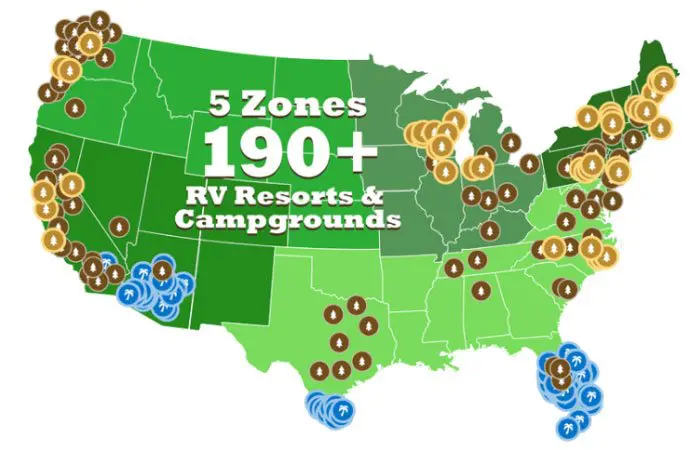
3. Buying our Thousand Trails Camping Membership
We knew we had to carefully manage our budget to succeed in RV living. So before we even hit the road, we bought a Zone Camping Pass from Thousand Trails (TT) to keep our camping expenses in check. Our TT membership has literally saved us thousands of dollars, and been a cornerstone of our travels. We have spent well over 700 nights in the system, staying in campgrounds all around the country.
After about 4 months, we upgraded our membership from the Zone Pass to an Elite, which would allow us to have longer stays. We have written a ton of articles about Thousand Trails here on our website over the years. We share the pros and cons, compare new vs used, and strive to give a balanced perspective on the TT network. It’s not for everyone, and we pick and choose our parks. But personally for us, TT has been a godsend. Not only in cost savings, but also the unexpected bonus of expanding of our RV community of friends, through the people we meet at the campgrounds.
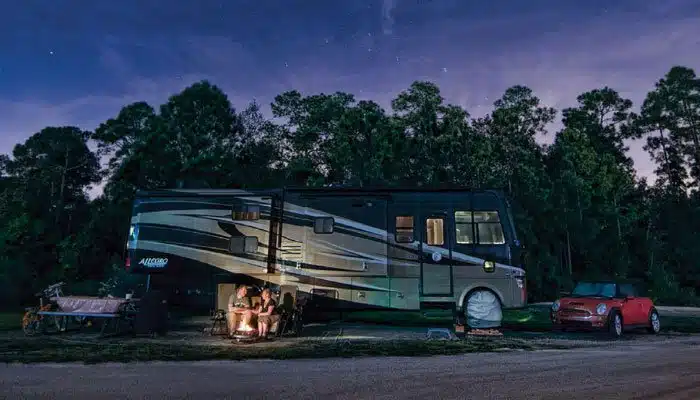
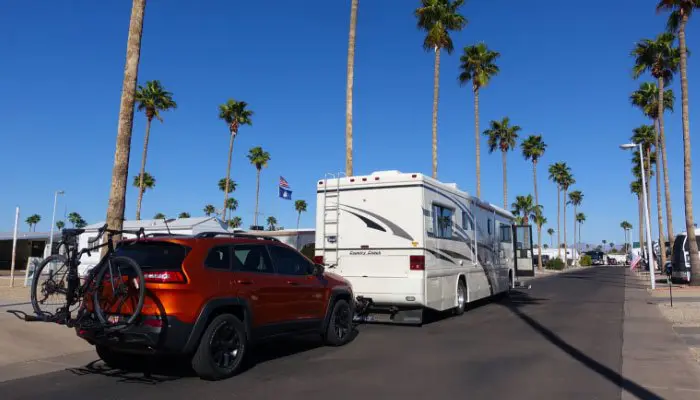
4. Switching to an older, diesel coach
In point two above, we shared how happy we were with our first coach. Why then, did we change to our current RV – a 1999 Country Coach Intrigue?
When we sold our 2012 Tiffin – a relatively new motorhome – and switched to a 20 year old RV it surprised a LOT of people, including us! We had been actively RV shopping, but only looking up to about 10-12 years old. Certainly not last century! But after three and a half years of full time RVing, our lives had changed. Our experience of RVs changed. And our wants and needs for Rv living had changed. We had more knowledge, confidence, and comfort in buying an older, yet high quality coach. And one where the manufacturer had even gone out of business in 2009!
After doing close to 20 RV factory tours over the years, we saw how these things are built. We figured that between us, we had the skills, interest and time to do an RV renovation. Plus, we wanted a really high quality, solid, well-built RV. But we also didn’t want to spend hundreds of thousands of dollars. Only to see the value rapidly depreciate! We’re still saving for retirement, remember! So being financially savvy and reducing risk was high value to us.
Being educated buyers, we had done our homework. We knew the Country Coach reputation for quality. We knew exactly what it was worth. And we had a professional RV inspection done. This identified some things that needed repair, which we used as leverage to negotiate pretty aggressively on the already low asking price of $35K. We ultimately picked CC up for $25K, well under the lower end of the deprecation curve. 🙂
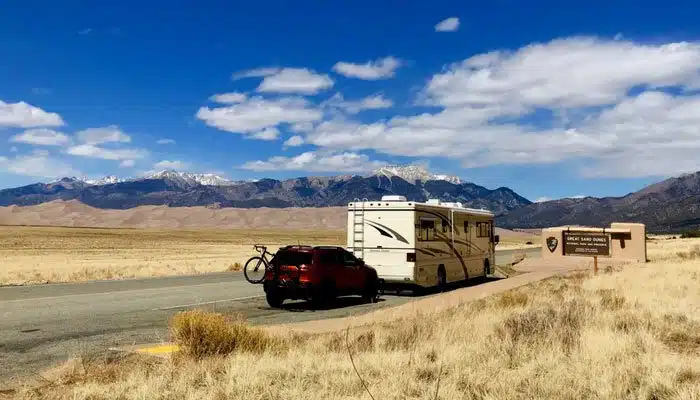
Fun fact
We bought CC for the difference between what we were offered on a trade-in on our Tiffin motorhome ($50K), and what we managed to sell it for privately retail ($75K). Yep, that’s $25,000. Not bad for a coach that originally sold for $230,000 way back in 1999!
Important note
Buying an RV is such an individual decision, and wants and needs can change over time. We do not believe – for a number of reasons – that CC would have been the best RV for us when we first started RV living in 2014. But it’s great for us now, especially since our RV makeover. We talk more about our reasons for making the switch here.
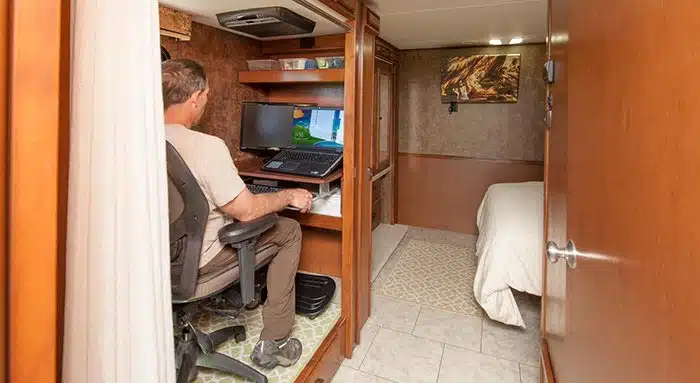
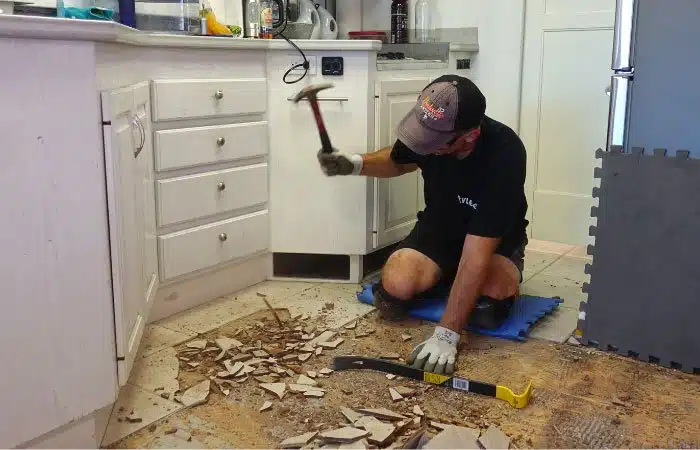
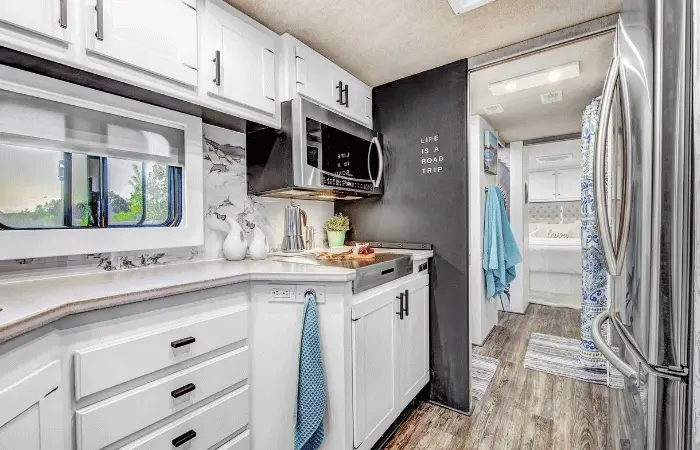
5. Investing in big upgrades on both RVs
Our fifth decision that we look back on with a lot of satisfaction is our decision to make the changes we did to our RVs. Many people we meet are hesitant to make any changes to their RVs. Whether they are concerned about the cost, the impact on resale, their DIY abilities, or maybe not even sure what they would do differently.
Likely it is because most RVers use them for short vacations. They simply don’t spend as much time in their RVs. For full timers like us though, our RV is our home. So making upgrades and personalizations is far more important, and worthwhile financially. For example, when you spend virtually every night sleeping in your RV, a great mattress quickly becomes important.
In our first RV, we converted the bunkhouse into an office. In both RVs we changed the layout of the dining area, and made many changes to appearance. More recently, we also made significant improvements to our off grid capabilities to allow us more flexibility in our RV living travel style.
And of course, we made massive upgrades to our Country Coach last summer, taking on a huge project in terms of time, energy and money. We shared all that in our Ultimate RV Makeover Series. We absolutely love our customized and remodeled ‘new to us’ coach. It was definitely worth the time, investment and energy for us. It works SO well for us now, and feels more like a luxury apartment than an RV. Considering how much time we spend in our motorhome – not only living, but also working – we feel a lot more settled now.
Oh, and contrary to common concerns about resale value. The upgrades we made actually increased the value of both of our RVs. And substantially enhanced our living comfort and enjoyment at the same time.

5 Biggest Mistakes and Regrets in RV Living
There is good learning from what we did right. But it is also useful to look back and review what we wish we had done differently. So let’s go over some of our mistakes and regrets.
1. Traveling too far and too fast
We were excited to hit the road and start living our new RV life!. So in our first week on the road, we headed straight for Lake Tahoe, California in mid June. Traveled up the west coast through Oregon and Washington. Then back down again by the end of 2014. We visited as many national parks, lighthouses and other bucket list places as we could! It was awesome! But keeping up such a travel pace was also exhausting.
I was still working weekdays 8-5 at my regular job. This meant we did our travel and exploring on weekends and after work. We were moving every week or two. And the first night’s sleep in a new place is often a bit unsettled. Shorter stays meant we had little or no time to explore an area before moving on again. We were about three months in (September) when we realized we needed to slow things down. We parked ourselves in a campground in Washington for two weeks and started making plans to revise our travel strategy. Slowing down helped us save money too.
We realized that if the RV living was going to be sustainable – and enjoyable – for us in the long term. Then we had to slow down, have longer stays. And remember that we can’t do everything we want in a single visit. And that’s OK. We can always come back! We’re better than we were in this department. But there is still plenty of room for improvement! It takes discipline for sure.

2. Our RV weight issues
RV safety is really important to us. And when we bought our first RV, I knew we needed to be mindful of staying within the safe weight carrying capacity. Our 2012 Tiffin motorhome chassis was 22,000 pounds. But we didn’t exactly know how much all of our ‘stuff’ would weigh. And it wasn’t easy to find that kind of information out there.
I had planned on weighing everything before loading it into the RV to make sure we were on track. But, we started to run out of time. While I was working during the day, Julie started moving most things into the RV. I remember her coming inside, after successfully finding storage places for our things. And excitedly making a declaration “It Just keeps taking it!” Yeah, the Tiffin had a great amount of storage capacity. Just not weight capacity!
We ended up loading more into the coach than we should have, at first. We eventually got around to weighing the RV, and discovered we were only over by a couple hundred pounds.Not terrible, but the weight distribution was uneven. You can read more about our RV weight loss journey here.
We did some deep purging and were able to remedy our weight problem pretty quickly. But I still think back to that time with some regret, knowing that we could have done a better job of weight management when starting out. I guess that is why we feel it is so important for us to share this kind of information with others. Because this was an area lacking in information available when we were doing our initial research.
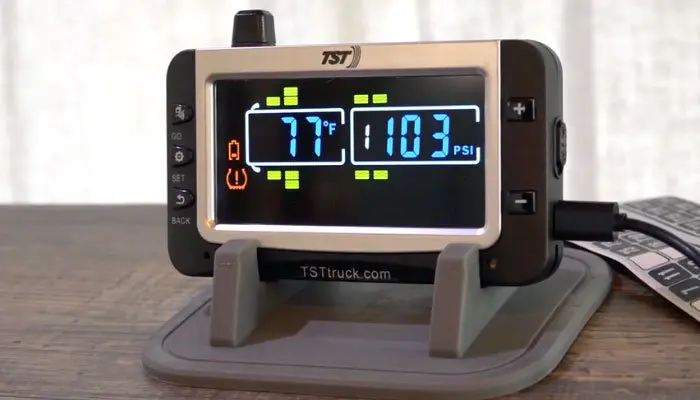
3. We should have invested in a TPMS system right away
Also related to safety, our next regret is not investing in a TPMS (Tire Pressure Monitoring System) for our RV from day one. I have always been mindful of the importance of tire safety. That’s why I always checked (and often adjusted) tire pressure before every drive. Sometimes I would even check all pressures in the middle of a long drive day just to be extra sure everything was OK. So in hindsight, I think I just did not realize how much a tire pressure monitoring system would have made my life so much easier. And safer.
All of that manual checking took a lot of time. It also meant frequent topping up of pressure that was let out. And, it was still only a small piece of the total information that can be gained from an automated system that is constantly monitoring tire pressure and temperature. Not just on the RV, but also our tow vehicle when towing.
We ended up installing a tire pressure monitoring system (TPMS) in February of this year. And its hands down one of my favorite devices. While my tire safety protocol was good from the beginning, and we did not experience a tire failure, it could have been so much better. When it comes to tires, you can never be too safe. I would definitely recommend budgeting for a TPMS system as part of your RV purchasing budget, from day one. Here is the review I did on our TPMS system, which I am SUPER happy with. You can find video reviews and links for more of our favorite RV safety (and other) gear here.,
4. Putting too much faith in the accuracy of our RV GPS
Ironically, it’s with a twist on RV tech, that I would say that my biggest regret with our RV GPS is that we trusted it TOO much. That said… I am still very glad we had it. And it’s been beneficial a lot of the time. But when it goes wrong, you don’t forget it in a hurry. This was one of our first purchases for our RV life on the road. We pulled the trigger on it soon after our Google Maps (which thinks we’re a car) took us on a few roads “non RV-friendly” roads”.
Even though we had programmed our RV GPS with our RV height, weight, length and number of propane tanks, that unit still tried to take us under low bridges and on dirt roads. The data in an RV GPS – while useful and accurate most of the time – is not perfect.
We definitely still consider RV GPS systems, apps and equipment very important and useful.
The problem for us came about when we became complacent. We just started to blindly trust that the RV GPS was choosing the best route, as it always had. Until it didn’t. So we learned our lessons and put more effort into our route planning these days.
We like using good ole fashion paper road atlases, and Mountain Directories to map our route and make sure we are avoiding major hills, if needed. There is also a new RV trip planning tool called RV Trip Wizard that we are just starting to use and will be reporting on soon.
What saved us in the times our RV GPS led us astray was paying attention to the road signs. Specifically low bridge heights. Even if you’re using a GPS or app of any kind, don’t get complacent. You need to still keep a close eye out on the road signs. Road conditions change, and apps and GPS don’t always have the most current information available.
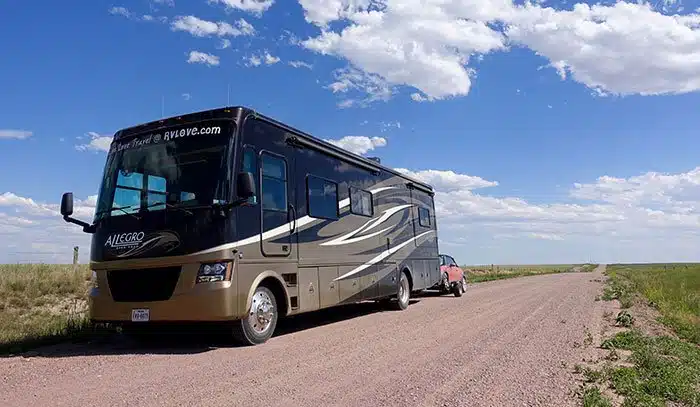
5. Our biggest regret is taking on too much = out of balance
Hands down, our biggest regret in our five years of RV travel is taking on way too much. At first, it happened gradually, then it seemed we went over a cliff in 2018. When we first hit the road back in 2014, we were already taking on a lot by trying to work full time, on top of traveling full time.
Then our RVLOVE blog and YouTube Channel exploded and took on a life of their own. Of course, we’re immensely grateful for our success and growth. And we are SO grateful to you – our RVLove community – for making it so. But work-life balance can be a slippery slope. As I wrote about in this blog post shortly after I quit my job. We live in such a ‘hustle society’ where busy-ness is championed and celebrated. Yes, it can even be hard to escape that as an RVer! That’s not how we want to live or be. That isn’t what we want to stand or be known for.
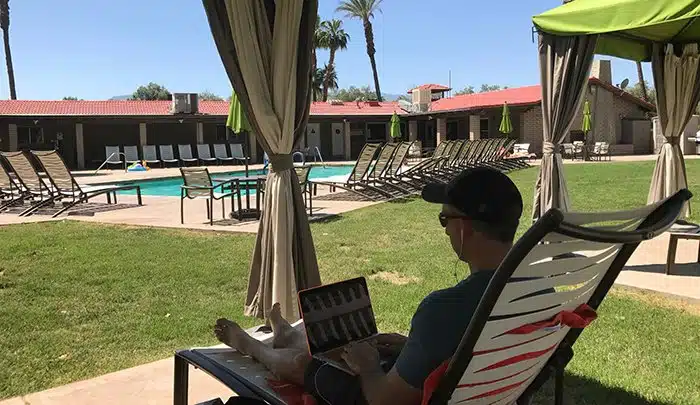
In Chapter 2 of our book “Living the RV Life – Your Ultimate Guide to Life on the Road” we talk about the importance of your WHY.
When planning for your RV life (or any life for that matter), defining your WHY – your reason for doing it – needs to stay at the forefront. If you want to be happy and fulfilled by what you’re doing and how you’re living, that is. At least, that’s the case for us.
By late spring of 2018, amidst living this awesome RV life, we realized we had taken on too many external projects. We were slowly but surely veering off-course. But our most painful moment of truth came on July 4th. We were putting the finishing touches on the final manuscript of our book for our publisher. We read it one last time, making final corrections and additions before hitting “send”.
And then it hit us.
This wonderful RV lifestyle that we wrote about in our book sounded awesome. Freeing, fun, full of adventure. And yet, we were no longer living it. Not like we used to. In the few short months between writing the book from late January to wrapping up the final edit in early July, we had changed. We weren’t traveling and exploring. We were burned out and exhausted. Of course, we don’t blame the book for that. Every big and worthwhile project requires an investment of time and energy. But we had allowed ourselves to become distracted by other external projects that drained our time, energy and our love.
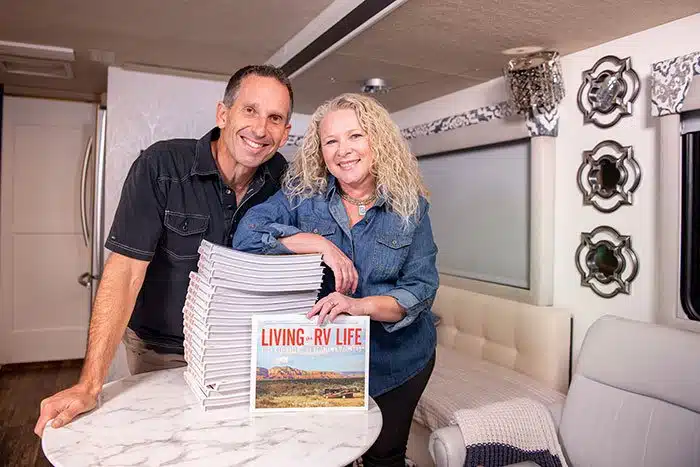
Photo credit: GabrielaPhoto.com
As a result, we suffered, our health suffered, our relationship suffered, our enjoyment of the lifestyle suffered. Our content suffered, and this meant you suffered too. We immediately knew things needed to change. But course corrections take time.
Since then, we’ve been working hard since then to prioritize the things that matter most – our health, wellbeing, and each other. We’ve been taking long drives in the Jeep, exploring, and creating more time for togetherness. We’ve been catching up on our content and re-defining what we want our future to look like. And we continue to review the pace at which we want to live, work and travel. One that is personally and professionally sustainable and joyful.
It feels good to be back on track again. But we’re not perfect. There is always room for improvement. So as we – and RV Love – continue to grow and evolve, we will continue to asking ourselves… are we living in alignment with our WHY.
To live and love our life, be a living example of our values, and share that authentically… with love.
What’s your why?
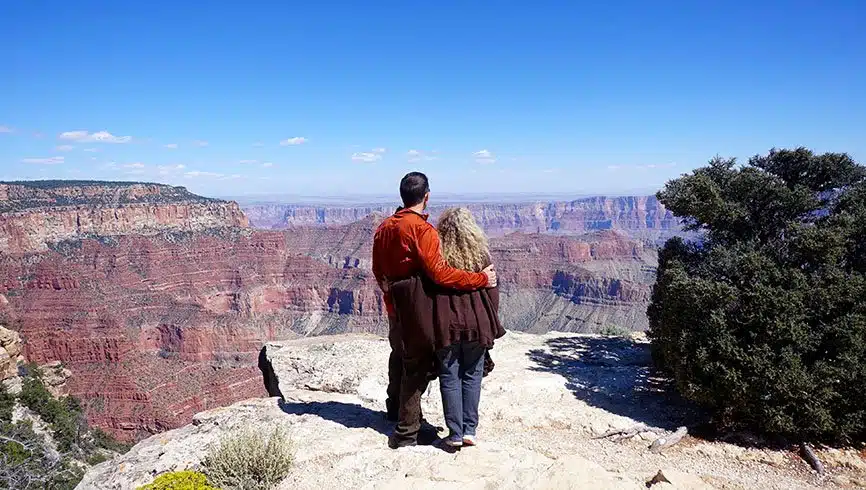
To be continued in Part 2
In part two, we will cover our top 5 challenges, 5 travel highlights, and personal highlights – from our five years on the road.
Sign up for our email newsletter with the latest RV park reviews, news and updates.
GOT COMMENTS OR QUESTIONS?
We would love to hear from you. Drop us a note in the comments section below.
More Reflective Content
Want to check out more content reflecting back on our travels and experiences? Hover over each image to see the title and post name.


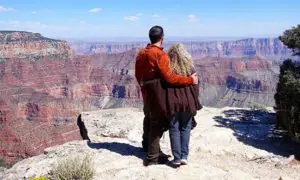

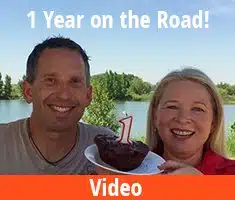

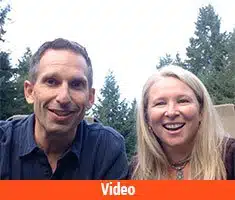
17 thoughts on “Reflecting on 5 Years of Full-time RV Living”
MY WIFE AND I HAVE MADE THE DECISION TO BE FULL TIME RV’ERS. WE’RE BOTH RETIRED, HEALTHY AND LOOKING FORWARD TO OUR NEXT CHAPTER/ADVENTURE. WE’VE BEEN RV CAMPERS AND SHORT DURATION ROAD TRIPPERS FOR MANY YEARS. BOTH OUR KIDS ARE GROWN AND DOING WELL ON THEIR OWN AND WE HAVE 2 GRAND KIDS. OUR SON WAS RECENTLY MARRIED SO WE’RE HOPEFULL FOR MORE.
THE THING THAT INTRIGUES ME MOST IS NOT HAVING A SCHEDULE FOR ANYTHING. IN 2017 WE TOOK A 9OOO MILE ROAD TRIP IN 62 DAYS TO SEE AMERICA. WAS A GREAT TRIP BUT I WAS SMOKED. TOOK ME A MONTH TO RECOVER. WE COULD’VE STAYED OUT LONGER BUT WE HAD WE WERE CLOSE TO EXHAUSTING THE BUDGET.
I GUESS ANOTHER THING IS OUR DEBT LOAD NEARLY GOES AWAY; NO MORTGAGE, NOE UTILITY BILLS, AND THIS IS MY FAVORITE, NO PROPERTY TAXES. WE HAVE 2020 JAYCO HT FIFTH WHEEL AND A PLENTY CAPABLE TRUCK. SO THIS TIME WE WILL EXPERIENCE AMERICA AND NOT JUST SEE IT.
I MUST SAY, WE HAD OUR CONCERNS ABOUT SAFETY AND SECURITY. THOSE CONCERNS QUICKLY VANISHED. EVERYONE WE MET WERE POLITE, FRIENDLY, AND HELPFUL WHEN WE NEED HELP (LIKE THAT TIME I GOT OUR RIG STUCK IN MUD TO THE AXLES) . THE LOCALS LAUGHED, I LAUGHED. HEY, NOTHING GOT BROKE AND NOBODY GOT HURT.
MAYBE WHEN I FIGURE OUT HOW TO GET THE PICTURES OFF MY PHONE AND INTO MY LAPTOP I’LL SHARE THE SIGHTS. YEAH, ME AND MR TECHNOLOGY ARE NOT FRIENDS.
Love this! So excited for your new adventures. Good luck and wishing you safe and happy travels!
Hi my name is Nancy …I’m not sure exactly what to ask I’m more needing your opinion on what you think or advise…my husband and I are 59 yrs old..we have a 17yr old autistic son. We have been talking seriously about selling our land and our home and just picking up and leaving after getting a larger motorhome .we want to travel and do a little living and enjoying our lives before we get to old to do so lol we live on 58 acres and have a aframe home and it’s getting harder with the upkeep on the land and home and most of all in need of a change in life …we have been married since 1985 and our lives have been all About our kids and grandkids our kids are grown and so are some of our grandkids ok they claim to be grown lol anyway lol we adopted our autistic son at birth from our daughter due to she was raped and tramatized to the point she couldn’t handle the baby but we couldn’t just let strangers have him and so we loved him before he was even born lol when he was around two yrs old we found out he was autistic it was painful at first but we wouldn’t trade our experience with him from birth for nothing .we learned more about love through him like never before… As far as he is concerned we are momma and daddy and my daughter he knows as sissy. She loves him very much the lord has blessed us! Anyway my question is lol your opinion on my hubby and I and our son if living in motorhome and traveling is a good idea knowing our challenges as older ppl with an autistic son..we want to sell the land and home and get bigger motor home but later on buy couple acres and put tiny home on it for a homebase but mostly live in motorhome and travel? I personally want to take the plunge but hubby keeps comming up with neg thoughts ..I think he is unsure of doing the right thing for us three…we are not familiar with the rv lifestyle …am I making since? Lmbo your opinion would be greatly appreciated…ty
Hi Nancy, thanks so much for your email. You sound like wonderful, loving people who are ready for a life change. We can totally understand that – your desire to go for it, but also your husband’s concerns.Especially considering your son’s needs. Here are some suggestions for you. Without knowing your son, if he likes to travel in an RV, or how well he adapts to change, you might want to ease into this starting with the property, before full time travel. It already sounds like the 58 acre property is getting too much for you And downsizing to a smaller piece of land where you can have a tiny home as base sounds like it would be more manageable, and you would have space to park a larger motorhome as well. You could live in the motorhome on the property and start with shorter trips, part time travel, and work your way up to full time. Or you could just go for it. You know your family better than anyone to make this decision. Your husband wants the best for your family and his concerns are not uncommon. We feel a lot of these concerns would be answered by reading or listening to our first book “Living the RV Life – Your Ultimate Guide to Life on the Road” as it goes through all of those considerations – financial, emotional etc. Many people find that when their families express concern about their decision to full time RV, but after reading the book, they feel a lot more peace of mind having their questions answered and knowing that there is a well thought our and considered plan. You can find it everywhere – here’s a link for more info https://rvlove.com/livingthervlife – or borrow it from a library, or listen to it on audio. You can even sign up for a free trial on Audible.com and download / listen to the book for free. Plenty of options. I just know that there is so much information and guidance in there that will help you and your husband a lot, with having questions answered and a plan to navigate those very valid concerns. But, we know many people with special needs kids who full time RV and love the lifestyle, many of the kids thrive in an RV and being in a more natural environment. And there are groups like Full Time families which would be tremendous for you to join and get support – again. Many of those families could offer a lot more in-depth advice and experience in the area of dealing with autistic children on the road. Here is their website to learn more, https://www.fulltimefamilies.com they also have a facebook group. It definitely sounds like you are a turning point in your lives, and you are looking forward to some new adventures and experiences, after taking care of your family so well for decades. It’s your time to go explore and enjoy what this country has to offer, but it will be so much easier when you and your husband are on the same page. Hopefully what he reads or hears in the book will help him get a clearer picture of what to expect, and he may start to come around and realize that there are solutions to every concern he may have. Allow him the time and space to reach his own level of comfort with this possibility. We hope this helps, and wish the very best to you and your family! God bless you. Julie and Marc
Good morning
Are you intending to continue your journey or
do you intend to move to sticks and bricks?
We just celebrated 6 years on the road in June! We will always keep on RVing, but weighing up our options of what they might look like in the future.
I’m an RN we are going to he doing this while I work 3 month contract jobs
That’s awesome!
I really enjoy your blog. We are making the leap in March. I need to work while on the road. Any suggestions for internet?
Hi Kari, congrats on your decision to make the leap in March! Internet is a BIG question as the setup will vary for everyone depending on needs. We are working on a connectivity piece but it won’t be up before late Feb. But know that you CAN get sufficient internet to be able to work on the word… but it will likely cost you more than you are used to with home internet. If you don’t already follow RVMobileInternet.com that is great resource. Also Mobile Must Have https://rvlove.com/MobileMustHave is where you can get the router that we have… and monthly unlimited plans – hope that helps as a starting point to start learning. You need to determine what your needs are going to be first and go from there… but it CAN be done, as many of us have been demonstrating.
I’m an RN we are going to he doing this while I work 3 month contract jobs
We are in our first few months of full time living, did all the research, took your course, read your book, etc. I want to adhere to the advice of slow down, knowing you can come back to an area at a later time, but I am trying to balance travel time versus stay time.
By that I mean, I don’t want to drive more than six hours in a day. And if we drive a day, I want to stay connected for at least two days. But that can put you in a place you really don’t want to be for two days before moving on to where you want to be next. How do you handle this?
Hello Paul. Julie here – Awesome to see how much research and education you have undertaken on your journey! Love hearing our book and school have been helpful to you as well. Your question is a GREAT one. And one we have constantly juggled ourselves over the past 5 years. Driving max 6 hours a day then staying 2 days can DEFINITELY put you in a place you don’t really want to be for those two days before moving on. In fact, we just experienced this ourselves in a 3,000 mile drive from Maine to Oregon this month. We were incentivized to get to our destination ASAP, and had visited many of the places we were driving through, so didn’t want to stay long anywhere. We just wanted to get settled and relax. We will be covering what we did in a blog post/video… however, the pace WE did was a big one, and not necessarily one we recommend! Especially when you’re relatively new. Basically, we planned our route in advance, considering which roads we wanted to travel for optimal safety, comfort and enjoyment. Sometimes we did shorter drive days and sometimes we did longer drive days – all depending on where we were, what we wanted to see (or didn’t) and how we believed we would be feeling as the journey progressed. Of course, that comes with experience. It’s about knowing your route, your rig and yourself… when determining your ideal travel pace and what you can and cannot (or do and don’t WANT) to so.
We would adjust our travel schedule accordingly as needed based on how Marc felt, as the driver. But mostly we stuck with the original plan and intended stops (as a guide, not exactly). We only booked 1 of our 9 night stays in advance (we had plans to meet friends there) and made several short stops along the way to break up the drive. Then stayed overnight (often at a Walmart) and continued on again the next day. That made the drive days longer than 6 hours, but it didn’t feel like it, as we had some variety in there, and a break. So you might like to AIM for a 6 hour drive followed by a two night stay as a general rule. But keep in mind that if the area is not particularly interesting to stay for two days, then just stay one night to get some rest. It probably won’t happen that often anyway – as there are plenty of interesting small towns – above all, just be flexible. We found that by getting an early start (sometimes we would be on the road before 7am, as long as we weren’t in a campground with quiet hours), we could also put in a bigger than usual drive day, especially if we took a decent break in the middle of the day. For example, we would start early, and carve out 2-3 hours in the day ‘on the way’ somewhere that wasn’t exciting enough for an overnight stay, but warranted a shorter visit. Maybe to stroll the main street, have lunch, even take a nap… Then if you are feeling up to it, drive a little longer. We found early morning starts were better for Marc as he is a morning person and also didn’t like driving west into the afternoon sun. We specifically chose routes that were ‘easier-driving’ (ie. slower speed limits, less traffic, fewer mountains/grades) to reduce stress and fatigue (mental/physical). Also check out apps like Roadtrippers for suggestions on things to do in the places you plan to spend a night or two – sometimes there are more interesting things in an area than you initially thought! But in general, I would say, don’t feel pressured to stick to 6 hours of driving followed by a 2 day stay ALL the time, just as a general goal. Listen to your body and ‘how you feel’ after a 6 hour drive and a 1 (or 2) night stay… and make adjustments as you need to. One day may be a 4 hour drive day… and another may be 6 or even 7-8 if you start early and take it easy. Driving conditions play a big part in how far you can comfortably drive. As long as the roads are easy, low traffic and you can put on cruise control… you may find you feel OK driving a little longer than 6 hours on occasion, if it means you will end up somewhere a little more interesting for a 2+ day stay. Or simply break up the drive with an overnight somewhere and continue on until you find a more exciting place. But by planning your route in advance and having at least an idea of what you will be driving through and how interesting you may find it, you might even change up which way you go so you intentionally plan more exciting diversions along the way. We did that by driving via Montreal and along the Trans-Canada Highway for the first leg of our journey. And planned to go via Craters of the Moon National Monument on the way to Boise, as we hadn’t been before. It’s in the middle of nowhere and we only spent an hour, but one could also easily spend 1-2 nights there. Hope some of this is helpful. Just stay flexible and don’t be afraid to adjust the mileage/hours driven or nights stayed every now and then. The main thing is you listen to your body and do what feels comfortable. (And if Marc has anything else to add when he gets back, I will have him chime in). All the best to you!
Another great post you guys. The 5 +/-‘s should be a mandatory read for everyone just starting out in RV life, great advice! Enjoy Oregon!
Thanks Dave – glad you enjoyed it!
Hi you 2, I like a lot of the things you wrote about living this lifestyle, the one thing you should put out front, and you did touch on it a bit was about what your choice of living/traveling accommodations are and what you “need” to expect in maintenance costs right from the start and like a stationary brick and mortar it will need constant attention and not necessarily in the areas you shared but the whole picture. When you’re moving your home down the road the perils can come at you 10 fold. I would like to talk to you more at length sometime about our travels and things that can come at you “very” unexpectedly in an instant, and we’ve only been full-timing for a year now…….Paul & Robin
Yes we could have talked for hours in that video, trying to cover everything! We do go to great lengths in our book “Living the RV Life” in terms of helping people manage expectations and understand their RV WILL need fixing, maintaining etc… and of course the extent is dependent on so many factors. Anything can happen and being prepared as best one can, having contingencies, the right coverage etc can help navigate all that. What kind of issues have you encountered? Sounds like quite the adventure you have had!